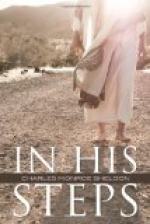“These are only a few illustrations of results in individual lives owing to obedience to the pledge. I meant to have spoken of President Marsh of Lincoln College. He is a graduate of my alma mater and I knew him slightly when I was in the senior year. He has taken an active part in the recent municipal campaign, and his influence in the city is regarded as a very large factor in the coming election. He impressed me, as did all the other disciples in this movement, as having fought out some hard questions, and as having taken up some real burdens that have caused and still do cause that suffering of which Henry Maxwell speaks, a suffering that does not eliminate, but does appear to intensify, a positive and practical joy.”
Chapter Twenty
“But I am prolonging this letter, possibly to your weariness. I am unable to avoid the feeling of fascination which my entire stay here has increased. I want to tell you something of the meeting in the First Church today.
“As I said, I heard Maxwell preach. At his earnest request I had preached for him the Sunday before, and this was the first time I had heard him since the Association meeting four years ago. His sermon this morning was as different from his sermon then as if it had been thought out and preached by some one living on another planet. I was profoundly touched. I believe I actually shed tears once. Others in the congregation were moved like myself. His text was: ‘What is that to thee? Follow thou Me.’ It was a most unusually impressive appeal to the Christians of Raymond to obey Jesus’ teachings and follow in His steps regardless of what others might do. I cannot give you even the plan of the sermon. It would take too long. At the close of the service there was the usual after meeting that has become a regular feature of the First Church. Into this meeting have come all those who made the pledge to do as Jesus would do, and the time is spent in mutual fellowship, confession, question as to what Jesus would do in special cases, and prayer that the one great guide of every disciple’s conduct may be the Holy Spirit.
“Maxwell asked me to come into this meeting. Nothing in all my ministerial life, Caxton, has so moved me as that meeting. I never felt the Spirit’s presence so powerfully. It was a meeting of reminiscences and of the most loving fellowship. I was irresistibly driven in thought back to the first years of Christianity. There was something about all this that was apostolic in its simplicity and Christ imitation.
“I asked questions. One that seemed to arouse more interest than any other was in regard to the extent of the Christian disciple’s sacrifice of personal property. Maxwell tells me that so far no one has interpreted the spirit of Jesus in such a way as to abandon his earthly possessions, give away of his wealth, or in any literal way imitate the Christians of the order, for example, of St. Francis




